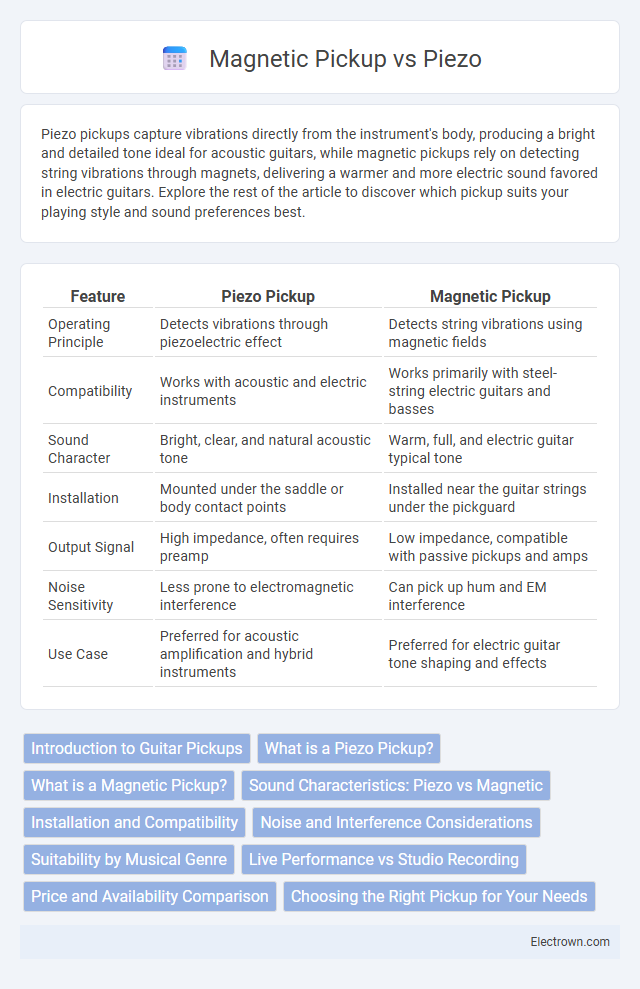Piezo pickups capture vibrations directly from the instrument's body, producing a bright and detailed tone ideal for acoustic guitars, while magnetic pickups rely on detecting string vibrations through magnets, delivering a warmer and more electric sound favored in electric guitars. Explore the rest of the article to discover which pickup suits your playing style and sound preferences best.
Table of Comparison
| Feature | Piezo Pickup | Magnetic Pickup |
|---|---|---|
| Operating Principle | Detects vibrations through piezoelectric effect | Detects string vibrations using magnetic fields |
| Compatibility | Works with acoustic and electric instruments | Works primarily with steel-string electric guitars and basses |
| Sound Character | Bright, clear, and natural acoustic tone | Warm, full, and electric guitar typical tone |
| Installation | Mounted under the saddle or body contact points | Installed near the guitar strings under the pickguard |
| Output Signal | High impedance, often requires preamp | Low impedance, compatible with passive pickups and amps |
| Noise Sensitivity | Less prone to electromagnetic interference | Can pick up hum and EM interference |
| Use Case | Preferred for acoustic amplification and hybrid instruments | Preferred for electric guitar tone shaping and effects |
Introduction to Guitar Pickups
Piezo pickups capture string vibrations through physical pressure changes on a crystal element, delivering a bright, acoustic-like tone ideal for unplugged and hybrid setups. Magnetic pickups, placed beneath strings, use electromagnetic induction to convert string vibrations into electric signals, producing a warmer, electric guitar sound with strong sustain and dynamic range. Choosing between piezo and magnetic pickups depends on the desired tonal characteristics and playing style, with piezo favored for acoustic clarity and magnetic pickups for classic electric tones.
What is a Piezo Pickup?
A piezo pickup converts mechanical vibrations from an instrument into electrical signals using piezoelectric materials, offering a clear, acoustic-like sound ideal for acoustic guitars and unamplified instruments. Unlike magnetic pickups that rely on string vibrations disrupting magnetic fields, piezo pickups capture the instrument's natural tone by detecting pressure changes on the instrument's body or bridge. Their ability to accurately reproduce string and body resonance makes piezo pickups a preferred choice for acoustic and classical instruments seeking authentic tonal quality.
What is a Magnetic Pickup?
A magnetic pickup is an electronic device commonly used in electric guitars to convert string vibrations into electrical signals by using a coil of wire wrapped around a magnet. It captures the string's motion through changes in the magnetic field, resulting in a warm, classic sound preferred in rock and blues music. Magnetic pickups require metal strings to function effectively, as non-magnetic materials cannot induce the necessary electromagnetic response.
Sound Characteristics: Piezo vs Magnetic
Piezo pickups deliver a bright, clear, and acoustic-like tone with strong high-frequency response, making them ideal for capturing the natural sound of your instrument. Magnetic pickups produce a warmer, fuller sound with pronounced midrange and bass frequencies, commonly used in electric guitars for their rich sustain and vintage vibe. Your choice between piezo and magnetic pickups will significantly affect the tonal character and dynamic responsiveness of your instrument.
Installation and Compatibility
Piezo pickups require careful placement on the instrument's body or bridge to capture vibrations accurately and often need a preamp for optimal sound quality, making installation more intricate compared to magnetic pickups. Magnetic pickups typically mount directly onto the guitar's body or under the strings and are designed to work seamlessly with electric guitar outputs, ensuring straightforward compatibility with standard amplifiers and effects. Your choice depends on the instrument type and desired setup ease, with magnetic pickups favoring electric guitars and piezo pickups excelling on acoustic or hybrid models.
Noise and Interference Considerations
Piezo pickups are highly sensitive to handling noise and prone to interference from electrical sources, resulting in potential hum or static in your audio signal. Magnetic pickups, with their electromagnetic design, naturally reject many types of radio frequency and electromagnetic interference, offering a cleaner sound in noisy environments. Choosing between piezo and magnetic pickups depends on your specific performance setting and whether you prioritize noise immunity or acoustic nuance.
Suitability by Musical Genre
Piezo pickups excel in acoustic genres such as folk, bluegrass, and classical due to their sensitivity to string vibration and natural tonal reproduction. Magnetic pickups are preferred in rock, blues, and metal for their ability to capture electric guitar's amplified sound with clarity and sustain. Musicians often choose based on the tonal qualities favored in their specific style, with piezo offering crisp highs and magnetic providing powerful midrange frequencies.
Live Performance vs Studio Recording
Piezo pickups excel in live performances by capturing acoustic instrument vibrations with clarity and feedback resistance, making them ideal for dynamic stage environments. Magnetic pickups offer rich tonal warmth and sustain that suit studio recordings where precise sound shaping and clean amplification are essential. Your choice hinges on whether you prioritize onstage durability or detailed audio quality for production.
Price and Availability Comparison
Piezo pickups are generally more affordable and widely available due to their simpler construction and common use in acoustic instruments. Magnetic pickups tend to be pricier, especially high-quality models designed for electric guitars, but they offer more variety in terms of tone and customization. Your choice may depend on budget constraints and the specific sound characteristics you aim to achieve.
Choosing the Right Pickup for Your Needs
Piezo pickups excel in capturing acoustic instrument nuances with high sensitivity to vibrations, making them ideal for natural, detailed sound reproduction. Magnetic pickups are preferred for electric guitars, offering strong signal output and classic tonal characteristics suitable for genres requiring sustain and distortion. Your choice depends on the desired tonal quality, instrument type, and performance context, ensuring optimal sound capture and amplification.
piezo vs magnetic pickup Infographic

 electrown.com
electrown.com